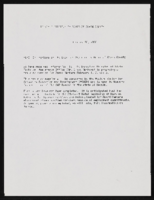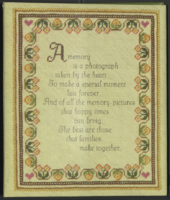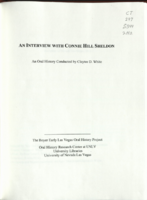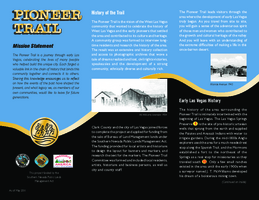Search the Special Collections and Archives Portal
Search Results

Transcript of Interview with Barbara Kirkland
Date
Archival Collection
Description
On a sunny day in 1946, the train from Shreveport, Louisiana, stopped at The Plaza hotel in downtown Las Vegas like it always did. But on this particular day, Atha Toliver and her only child, twelve-year-old Barbara, stepped off the train and onto the dusty Western street of Fremont. Narrator Barbara Bates Kirkland recalls that event and living in Las Vegas for most of the next seven decades during this 2004 interview. Like many others who migrated from the South, Barbara Kirkland’s mother would find employment as a maid. A friend who already lived in Las Vegas had told her of the good paying jobs as private maid. So Atha who was determined that her daughter would get an education and a finer future saw this as her opportunity to achieve this for her daughter. Later, the entrepreneurial and creative mother opened Eva’s Flower Basket, a floral shop that Barbara operates in her retirement from teaching. Barbara returned to Louisiana for her senior year in high school, attended Southern University in Baton Rouge, and then returned to Las Vegas to teach first grade at Westside School. Barbara was active in the community, was a founding member of Les Femmes Douze, involved with Zion United Methodist Church and was friends with many of the early African American community leaders at the time. She talks about these, describes various neighborhoods where she lived and about raising her own two children in Las Vegas. Barbara was a founding member of Les Femmes Douze. AKA/Akateens.
Text
Audio recording clips of interview with Theron and Naomi Goynes by Claytee D. White, June 28, 2012, and July 12, 2012
Date
Archival Collection
Description
Two audio clips from an interview with Theron and Naomi Goynes by Claytee D. White on June 28 and July 12, 2012. In the clips, Theron and Naomi remember their early years in the Las Vegas schools and the advent of desegregation.
Sound

Transcript of interviews with Edythe Katz-Yarchever by Claytee White, 2000-2005
Date
Archival Collection
Description
Transcript of interviews with Edythe Katz-Yarchever by Claytee White over the course of several sessions in 2000, 2003 and 2005. In the interviews, Katz-Yarchever discusses her life in Las Vegas, owning theaters with her husband, Lloyd Katz, and the strides they made in civil rights. She talks about her service in Civil Defense and the National Guard, and moving to various places, then working in California and meeting her husband, Lloyd. The Katzes became involved in the community in various ways with Operation Independence and Holocaust education. About a decade after Lloyd's death, Edythe married Judge Gilbert Yarchever.
Edythe Katz-Yarvhever was born in Boston, a second generation American whose grandparents left Russia the century before. Edythe completed finishing school at the start of World War II and worked various jobs at home before joining the Civil Defense, and later, the National Guard. She moved to Maryland and got a job as a secretary at Edgewood Arsenal, then transferred to Cushing General Hospital to assist a Marine Corps neurologist, who was also a Jewish refugee. Towards the end of the war, she is transferred to an Army hospital in Hawaii, and thus began the rest of her life on the West Coast. When the war ended, Edythe sailed to California and worked various jobs in Los Angeles: in the secretarial pool at MGM Studios, for a casting agency and for a hotel magazine. Edythe met Lloyd Katz in San Francisco, and the two were married after a short courtship. The couple lived in San Francisco before moving to Las Vegas in 1951, where they took over the management of the Huntridge, Palace and Fremont theaters, then leased by Edythe's parents. The Katzes took a stand to desegregate their theaters, allowing black customers to sit with white patrons. Edythe and Lloyd became active in the city's Civil Rights Movement, including work with Operation Independence and the NAACP. Edythe started organizations like Volunteers for Education and Junior Art League, and directed an interfaith, interracial preschool. Lloyd would frequently open up their theaters to organizations to hold fundraisers, free-of-charge. Edythe was extremely active in the local Jewish community, including opening the city's first Jewish gift shop, serving as sisterhood president at her synagogue and starting the Jewish Reporter. She later founded a library for Holocaust education as well as assisted the school district's development of curriculum and teacher training relating to the Holocaust. Lloyd Katz passed away in 1986, and in 1995, Edythe married Gilbert Yarchever. Edythe and Lloyd's community service work was honored with the naming of their school, the Edythe and Lloyd Katz Elementary School, where Edythe still remains active.
Text

Economic Opportunity Board of Clark County (Nev.): memos, agendas, and meeting minutes
Date
Archival Collection
Description
From the Clark County Economic Opportunity Board Records -- Series I. Administrative. This folder contains memos, agendas and minutes from meetings of the Clark County Economic Opportunity Board from January 1968 through June 1968.
Text

Mabel Hoggard: scrapbook
Date
Archival Collection
Description
From the Mabel Hoggard Papers (MS-00565) -- Personal papers file. This scrapbook contains event programs; newspaper clippings about Mabel Hoggard; photographs of Mabel Hoggard, family, and friends; and letters to Mabel Hoggard. Items include: Mabel Hoggard Elementary School 1981 graduation program; biographical sketch of Mabel Hoggard; "Happenings: successful steps toward school integration: report #1, what's happening in Clark County School?" February 10, 1969; and Westside Council tenth meeting summary, May 27, 1969.
Mixed Content

Transcript of interview with Connie Hill Sheldon by Claytee White, February 11, 2013
Date
Archival Collection
Description
Connie Hill Sheldon and her identical twin, Billie, also were members of Rancho High School 's first graduating class of 1962. Connie and Billie were born in 1944 in Oklahoma and spent their early years in southern California before moving to Las Vegas in 1956 with their mother, brother, and stepfather, Gerald Elmore. In Las Vegas Connie and her siblings attended Sunrise Acres Elementary School before going to Rancho, and the family was active with Homesite Baptist Church. While she was at Rancho Connie worked at the Huntridge Theater, and she continued working there after she graduated. In 1968 Connie married fellow Rancho '62 classmate Clyde Sheldon in Goldfield, Nevada. At the time of their marriage Clyde was an active-duty Marine. Over the course of his twenty-year USMC career the Sheldons lived in several places, but following his 1983 retirement they returned to Las Vegas and then moved to Pahrump. In this interview Connie particularly focuses on military life in New Yo
Text
Hoggard, Mabel, 1905-1989
Mabel Hoggard was the first licensed African-American educator in Nevada. Hoggard taught primarily first and second grade at various elementary schools throughout Clark County, Nevada from 1946 until her retirement in 1970. The schools she taught at included Westside Elementary, Matt Kelly Elementary, Highland Elementary, and C.V.T. Gilbert Elementary, all located in Las Vegas, Nevada.
Person

Brochure, Pioneer Trail of West Las Vegas community
Date
Archival Collection
Description
Brochure highlights and maps historic points of interest in West Las Vegas.
Text

Harold McKay interview, March 13, 1981: transcript
Date
Archival Collection
Description
On March 13, 1981, Dana Jamerson interviewed Harold McKay (b. July 27th, 1903 in Dresden, Kansas) about his life as a teacher in Las Vegas, Nevada. McKay speaks about his education, his move from Chicago, Illinois to Las Vegas and how he began his career in education. McKay focuses on how and why he founded the Teacher’s Credit Union, his time working in administration and his business school, as well as the problems related to segregation and integration in the educational system. Lastly, he talks about the growth of the gaming and entertainment industry in Las Vegas, and his volunteer work with the Senior Citizen Center.
Text
